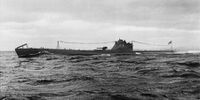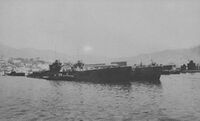Engineering:Type C submarine
| Class overview | |
|---|---|
| Name: | Type-C submarines |
| Builders: |
|
| Operators: |
|
| Preceded by: | Junsen type submarine |
| Subclasses: |
|
| Built: | 1937-1944 |
| In commission: | 1940-1945 |
The Cruiser submarine Type-C (巡潜丙型潜水艦 Junsen Hei-gata sensuikan) was one of the first classes of submarine in the Imperial Japanese Navy (IJN) to serve during the Second World War. Type-C submarines were better armed than the Type-A and Type-B. The Type-Cs were also utilized as Kō-hyōteki or Kaiten mother ships, for this reason they were not equipped with aviation facilities.
Class variants
The Type-C submarines were divided into three classes:
- Type-C (丙型(伊十六型) Hei-gata, I-16-class)
- Type-C Mod. (丙型改(伊五十二型) Hei-gata Kai, I-52-class)
- Type V22B (第379号艦型 Dai-379-Gō kan-gata, Vessel number 379-class). However, the Vessel number 379-class was never built.
Type-C (I-16 class)
Project number S38 and S38B (Latter batch). They were based on the I-7 class. Eight boats were built between 1937 and 1944 under the Maru 3 Programme (Boats 44 - 48) and the Maru Kyū Programme (Boats 376 - 378).
- Boats in class
| Boat No. | Boat | Builder | Laid down | Launched | Completed | Results | Fate |
| 44 | I-16 [1] | Mitsubishi, Kōbe Shipyard Kure Naval Arsenal (after launch) |
15-09-1937 | 28-07-1938 | 20-03-1940 | Sank Yugoslav merchant ship Susak on 06-06-1942. Sank Greek merchant vessel Aghios Georgios IV on 07-06-1942. Sank Yugoslav merchant ship Supetar on 12-06-1942. Sank Swedish merchantman Eknaren on 01-07-1942. |
Sunk by USS England northeast of Buin at [ ⚑ ] 05°10′S 158°10′E / 5.167°S 158.167°E on 19-05-1944. |
| 45 | I-18 | Sasebo Naval Arsenal | 25-08-1937 | 12-11-1938 | 31-01-1941 | Sank Norwegian merchant ship Wilford on 08-06-1942. Sank Dutch merchant vessel De Weert on 01-07-1942. Sank RMS Mundra on 08-07-1942. |
Sunk by USS Fletcher southeast of Guadalcanal at [ ⚑ ] 14°15′S 161°53′E / 14.25°S 161.883°E on 11-02-1943. |
| 46 | I-20 | Mitsubishi, Kōbe Shipyard | 16-11-1937 | 25-01-1939 | 26-09-1940 | Damaged HMS Ramillies on 09-05-1942 by Kō-hyōteki. Damaged RMS British Loyalty on 09-05-1942 by Kō-hyōteki. Sank Panamanian merchant ship Johnstown on 05-06-1942. Sank Greek merchant vessel Christos Markettos on 08-06-1942. Sank RMS Mahronda 11-06-1942. Sank Panamanian merchantman Hellenic Trader on 12-06-1942. Sank RMS Clifton Hall on 12-06-1942. Sank Norwegian merchant ship Goviken on 30-06-1942. Sank RMS Steaua Romana on 30-06-1942. Damaged unknown merchant ship on 03-12-1942 by Kō-hyōteki. |
(1). Sunk by USS Ellet at New Hebrides on 03-09-1943.[2] (2). Sunk by USS Eaton at Vella Lavella on 01-10-1943. |
| 47 | I-22 | Kawasaki, Kōbe Shipyard | 25-11-1937 | 23-12-1938 | 10-03-1941 | Sunk by a PBY-5A Catalina flying boat near Malaita in the Solomon Islands at [ ⚑ ] 11°22′S 162°20′E / 11.367°S 162.333°E on 6-10-1942. | |
| 48 | I-24 | Sasebo Naval Arsenal | 05-12-1938 | 12-11-1939 | 31-10-1941 | Sank HMAS Kuttabul on 31-05-1942 by Kō-hyōteki. Sank Australian merchant ship Iron Chieftain on 03-06-1942. Damaged RMS Orestes on 09-06-1942. Damaged USS Alchiba on 07-12-1942 by Kō-hyōteki. |
Rammed and sunk by USS PC-487 at Kiska [ ⚑ ] 53°16′N 174°24′E / 53.267°N 174.4°E on 11-06-1943. |
| 376 | I-46 (Latter batch) |
Sasebo Naval Arsenal | 21-11-1942 | 03-06-1943 | 29-02-1944 | Probably lost in an accident or sunk by enemy attack east of Leyte Gulf, after 26-10-1944.[3][4]:567:585 | |
| 377 | I-47 (Latter batch) |
Sasebo Naval Arsenal | 21-11-1942 | 29-09-1943 | 10-07-1944 | Sank USS Mississinewa on 20-11-1944 by Kaiten. | Converted to a Kaiten mother ship, at the end of 1944, decommissioned on 30-11-1945, sunk as a target off the Gotō Islands on 01-04-1946. |
| 378 | I-48 (Latter batch) |
Sasebo Naval Arsenal | 19-06-1943 | 12-12-1943 | 05-09-1944 | Converted to a Kaiten mother ship, end of 1944, sunk by USS Corbesier and USS Conklin at Ulithi [ ⚑ ] 09°45′N 138°20′E / 9.75°N 138.333°E on 23-01-1945.[5] |
Type-C Mod. (I-52 class)
Project number S37D. Twenty boats were planned under the Maru Tsui Programme (Boats 625 - 632) and the Kai-Maru 5 Programme (Boats 5141 - 5155). According to their Project number, they were one of the variants of the Type-B submarine. Seventeen boats were cancelled in late 1943, because the IJN was planning to build the Type E submarine (戊型潜水艦 Bo-gata sensuikan) which was to become the primary submarine in 1945.
- Boats in class
| Boat No. | Boat | Builder | Laid down | Launched | Completed | Results | Fate |
| 625 | I-52 | Kure Naval Arsenal | 18-03-1942 | 10-11-1942 | 28-12-1943 | Sunk by aircraft from USS Bogue west of Cap-Vert at [ ⚑ ] 15°16′N 39°55′W / 15.267°N 39.917°W on 24-06-1944. | |
| 626 | I-53 | Kure Naval Arsenal | 15-05-1942 | 24-12-1942 | 20-02-1944 | Damaged USS Marathon 21-07-1945 by Kaiten. Sank USS Underhill on 24-07-1945 by Kaiten. Damaged USS Earl V. Johnson on 04-08-1945 by Kaiten. |
Converted to a Kaiten mother ship in July 1944. Decommissioned on 30-11-1945, sunk as a target off the Gotō Islands on 01-04-1946. |
| 628 | I-55 | Kure Naval Arsenal | 15-06-1942 | 20-04-1943 | 20-04-1944 | Sunk by USS Wyman, USS Reynolds and aircraft from USS Hoggatt Bay east of the Mariana Islands on 28-07-1944.[6] | |
| 630 632 |
I-57 I-59 |
Cancelled in 1943. | |||||
| 5141 - 5155 |
Type V22B
Project number S49B. Twenty eight boats were planned under the Maru Kyū Programme (Boats 379 - 381) and the Kai-Maru 5 Programme (Boats 5156 - 5180). All boats were cancelled in late 1943, because the IJN was planning to build the Type E submarine (戊型潜水艦 Bo-gata sensuikan).
- Boats in class
| Boat No. | Boat | Builder | Laid down | Launched | Completed | Fate |
| 379 - 381 | Cancelled in 1943. | |||||
| 5156 - 5180 |
Characteristics
| Type | Type-C (I-16) | Type-C Latter batch (I-46) | Type-C Mod. (I-52) | Type V22B | |
| Displacement | Surfaced | 2,184 long tons (2,219 t) | 2,184 long tons (2,219 t) | 2,095 long tons (2,129 t) | 2,285 long tons (2,322 t) |
| Submerged | 3,561 long tons (3,618 t) | 3,564 long tons (3,621 t) | 3,644 long tons (3,702 t) | No data | |
| Length (overall) | 109.30 m (358 ft 7 in) | 109.30 m (358 ft 7 in) | 108.70 m (356 ft 8 in) | 106.50 m (349 ft 5 in) (waterline) | |
| Beam | 9.10 m (29 ft 10 in) | 9.10 m (29 ft 10 in) | 9.30 m (30 ft 6 in) | 9.64 m (31 ft 8 in) | |
| Draft | 5.34 m (17 ft 6 in) | 5.35 m (17 ft 7 in) | 5.12 m (16 ft 10 in) | 5.26 m (17 ft 3 in) | |
| Depth | 7.80 m (25 ft 7 in) | 7.80 m (25 ft 7 in) | 7.90 m (25 ft 11 in) | No data | |
| Power plant and shaft | 2 × Kampon Mk.2 Model 10 diesels 2 shafts |
2 × Kampon Mk. 2 Model 10 diesels 2 shafts |
2 × Kampon Mk. 22 Model 10 diesels 2 shafts |
2 × Kampon Mk. 2 Model 10 diesels 2 shafts | |
| Power | Surfaced | 12,400 bhp | 12,400 bhp | 4,700 bhp | 11,000 bhp |
| Submerged | 2,000 shp | 2,000 shp | 1,200 shp | 2,400 shp | |
| Speed | Surfaced | 23.6 knots (43.7 km/h) | 23.6 knots (43.7 km/h) | 17.7 knots (32.8 km/h) | 22.4 knots (41.5 km/h) |
| Submerged | 8.0 knots (14.8 km/h) | 8.0 knots (14.8 km/h) | 6.5 knots (12.0 km/h) | 8.0 knots (14.8 km/h) | |
| Range | Surfaced | 14,000 nmi (26,000 km) at 16 knots (30 km/h) | 14,000 nmi (26,000 km) at 16 knots (30 km/h) | 21,000 nmi (39,000 km) at 16 knots (30 km/h) | 14,000 nmi (26,000 km) at 16 knots (30 km/h) |
| Submerged | 60 nmi (110 km) at 3 knots (5.6 km/h) | 60 nmi (110 km) at 3 knots (5.6 km/h) | 105 nmi (194 km) at 3 knots (5.6 km/h) | 80 nmi (150 km) at 3 knots (5.6 km/h) | |
| Test depth | 100 m (330 ft) | 100 m (330 ft) | 100 m (330 ft) | 100 m (330 ft) | |
| Fuel | 816 tons | 751 tons | 842.8 tons | 735 tons | |
| Complement | 95 | 94 | 94 | No data | |
| Armament (initial) | • 8 × 533 mm (21 in) Torpedo tubes (8 × front) • 20 × Type 95 torpedoes • 1 × 140 mm (5.5 in) L/40 11th Year Type Naval gun[7] • 2 × Type 96 25mm AA guns |
• 8 × 533 mm (21 in) TTs (8 × front) • 20 × Type 95 torpedoes • 1 × 140 mm (5.5 in) L/40 11th Year Type Naval gun[7] • 2 × Type 96 25mm AA guns |
• 6 × 533 mm (21 in) TTs (6 × front) • 17 × Type 95 torpedoes • 2 × 140 mm (5.5 in) L/40 11th Year Type Naval gun[7] • 2 × Type 96 25mm AA guns |
• 8 × 533 mm (21 in) TTs (8 × front) • 18 × torpedoes • 1 × 140 mm Naval gun • 4 × 25mm AA guns • 8 × naval mines | |
Footnotes
- ↑ 伊号第16潜水艦 (I-Gō Dai-16 Sensuikan). The same shall apply hereinafter.
- ↑ Other opinion for the I-182.
- ↑ She contacted the 6th Fleet HQ on 26-10-1944. Therefore, the US Navy's record assuming that she was sunk by USS Richard M. Rowell on 24-10-1944 is an error. Reported sunk two different times by different U.S. Navy ships in The official chronology of the U.S. Navy in World War II – Chapter VI: 1944 p.567 & p.585
- ↑ Cressman, Robert (2000). "Chapter VI: 1944". The official chronology of the U.S. Navy in World War II. Annapolis, Maryland: Naval Institute Press. ISBN 978-1-55750-149-3. OCLC 41977179. http://www.ibiblio.org/hyperwar/USN/USN-Chron/USN-Chron-1944.html. Retrieved 2020-06-01.
- ↑ Some sources stated that the I-48 was sunk at [ ⚑ ] 09°55′N 138°17.3′E / 9.917°N 138.2883°E.
- ↑ This is one opinion, because this conflicts with I-55's action records.
- ↑ 7.0 7.1 7.2 Campbell, John Naval Weapons of World War Two ISBN:0-87021-459-4 p.191
Bibliography
- "Rekishi Gunzō". http://rekigun.net/., History of Pacific War Vol.17 I-Gō Submarines, Gakken (Japan), January 1998, ISBN:4-05-601767-0
- Rekishi Gunzō, History of Pacific War Vol.35 Kō-hyōteki and Kōryū, Gakken (Japan), April 2002, ISBN:4-05-602741-2
- Rekishi Gunzō, History of Pacific War Vol.36 Kairyū and Kaiten, Gakken (Japan), May 2002, ISBN:4-05-602693-9
- Rekishi Gunzō, History of Pacific War Extra, "Perfect guide, The submarines of the Imperial Japanese Forces", Gakken (Japan), March 2005, ISBN:4-05-603890-2
- Model Art Extra No.537, Drawings of Imperial Japanese Naval Vessels Part-3, Model Art Co. Ltd. (Japan), May 1999, Book code 08734-5
- The Maru Special, Japanese Naval Vessels No.31 Japanese Submarines I, Ushio Shobō (Japan), September 1979, Book code 68343-31
See also
 |



